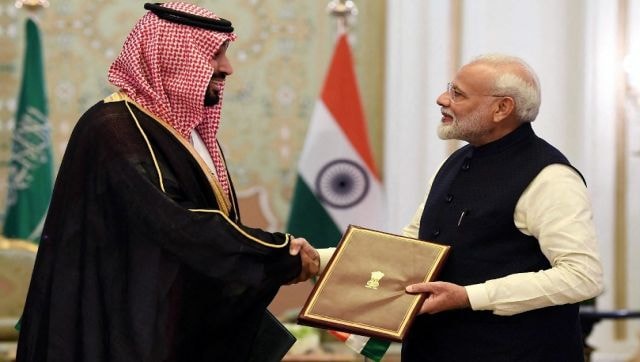Saudi Prince, Faisal bin Farhan Al Saud is expected to be in New Delhi this weekend as part of his first visit to India as foreign minister where talks will mostly focus on the evolving situation in Afghanistan
Saudi Arabia foreign minister Prince Faisal bin Farhan Al Saud is expected to visit India this weekend to discuss the unfolding situation in Afghanistan and the Taliban’s takeover of the country.
Prince Faisal, scheduled to land in India on 19 September, is expected to hold meetings with External Affairs Minister Dr S Jaishankar, National Security Advisor (NSA) Ajit Doval and also Prime Minister Narendra Modi.
This meet comes after Prime Minister Narendra Modi discussed the Afghanistan situation with UAE crown prince Sheikh Mohammed bin Zayed Al Nahyan on 3 September over the telephone, External Affairs Minister S Jaishankar hosted Dr Anwar Gargash, diplomatic advisor to UAE president, on 30 August and exchanged notes on the Kabul crisis.
Qatar, Turkey’s and Pakistan’s proximity to Taliban
India's allies in West Asia, Saudi Arabia and the UAE, are worried about the security ramifications of a Taliban-led Afghanistan and the ties shared by the Taliban and global terrorist networks.
The two nations are also said to have been perturbed by the active role played by Qatar, Turkey and Pakistan in engaging with the Taliban regime.
Qatar has turned out to be a trusted mediator in this conflict.
Doha has become a key broker in Afghanistan following last month's withdrawal of US forces, helping evacuate thousands of foreigners and Afghans, engaging the new Taliban rulers and supporting operations at Kabul airport.
Since the US pullout, Qatar Airways planes have made several trips to Kabul, flying in aid and Doha's representatives and ferrying out foreign passport holders.
Meanwhile, Turkey, which has strong historical and ethnic ties in Afghanistan, has been on the ground with non-combat troops as the only Muslim-majority member of the NATO alliance there.
According to analysts, it has developed close intelligence ties with some Taliban-linked militia. Turkey is also an ally of neighbouring Pakistan, from whose religious seminaries the Taliban first emerged.
Last week, it was reported that Turkish officials held talks with the Taliban lasting over three hours. Some of the discussions were about the future operation of the airport itself, which Turkish troops have guarded for six years.
President Recep Tayyip Erdogan has also stated: "Turkey is ready to lend all kinds of support for Afghanistan's unity but will follow a very cautious path."
Professor Ahmet Kasim Han, an expert on Afghan relations at Istanbul's Altinbas University, while speaking to BBC said that he believes dealing with the Taliban will provide President Erdogan with an opportunity.
He says Turkey may try to position itself as "guarantor, mediator, facilitator", as a more trusted intermediary than Russia or China, who have kept their embassies open in Kabul.
"Turkey can serve that role," he says.
According to experts, the Taliban takeover in Afghanistan has delivered a strategic victory to Pakistan, establishing a friendly government in Kabul for the first time in nearly 20 years.
Pakistan has backed the Taliban from their earliest days. Islamabad was one of only three countries to recognise the Taliban government in the 1990s and the last to break formal ties with it in 2001.
It also provided safe havens to Taliban leaders and medical facilities for wounded fighters. This assistance helped sustain the Taliban, even as they lost thousands of foot soldiers.
Pakistan last week sent supplies such as cooking oil and medicine to authorities in Kabul, while the country's foreign minister called on the international community to provide assistance without conditions and to unfreeze Afghanistan’s assets.
Additionally, a Pakistan International Airlines plane from Islamabad flew to Kabul on Monday, making it the first flight to land in Afghanistan from neighbouring Pakistan since the chaotic final withdrawal of US troops last month.
Saudi-Taliban ties
In the past, they worked together. But today, Saudi Arabia and the Taliban are separated by political and cultural differences, as well as some problematic history.
The last time the Taliban ran Afghanistan, between 1996 and 2001, Saudi Arabia was one of only three countries in the world to officially recognise the Islamist group's government. Neighbouring Pakistan and the United Arab Emirates (UAE) were the other two.
The situation changed dramatically for Saudi Arabia and the UAE after Al-Qaeda, the Sunni Muslim terrorist group, carried out suicide attacks in the US on 11 September, 2001, resulting in the deaths of over 3,000 people.
This was because Saudi Arabia had a diplomatic relationship with the United States since 1940 and the American were the Kingdom's strongest allies in trade and security.
Experts note that Saudi Arabia's once-close ties will not be revived any time soon.
The Saudi-US alliance remains important, and the country's ongoing cultural changes also play a part in this.
Saudi's controversial crown prince, Mohammed bin Salman, is trying to modernise his country and the idea of a more liberal and open Saudi Arabia doesn't sit well with lending support to Islamist extremists in other countries.
Moreover, Kabir Taneja, a fellow at the India-based think tank Observer Research Foundation, wrote, "To maintain its image as an upcoming investment mecca, Riyadh will have to make sure it does not once again become home to mass migration of fighters flying in and out of the Afghanistan … or become a hub of funding enabling extremist activities."
Where does India come in?
India’s policymakers must look to Saudi Arabia to expand cooperation in anti-terrorism activities and expand dialogue on relations between the two, which will help protect the India's interests related to Afghanistan.
Saudi Arabia also believes that closer ties to India will help re-balance the geopolitics of the region, whereas India believes a good relationship with Saudi will give it a chance to counter a hostile China-Pakistan axis gaining strategic depth across the Khyber.
Inputs from agencies

















